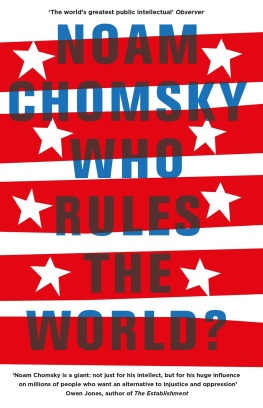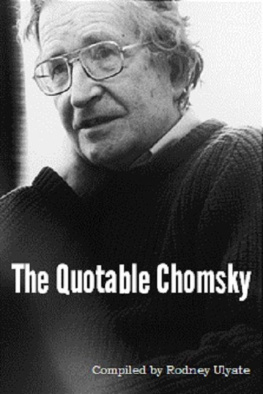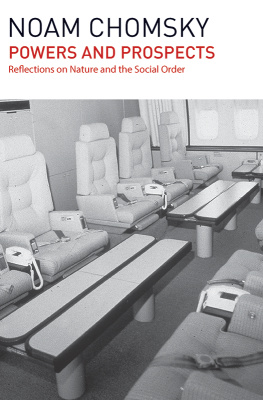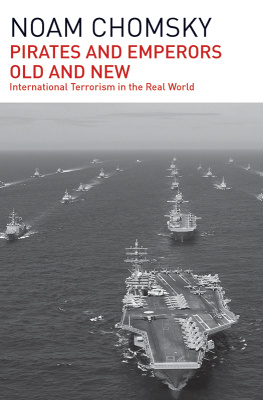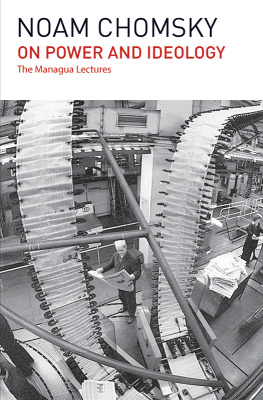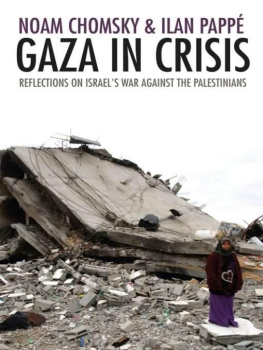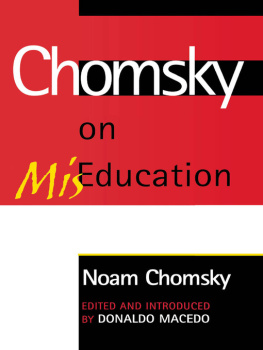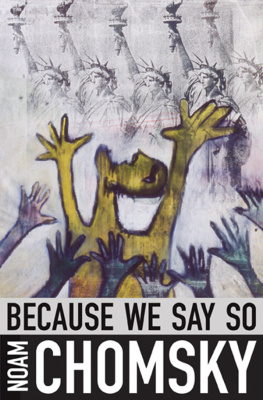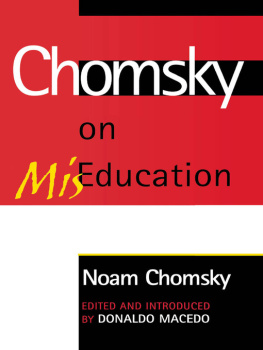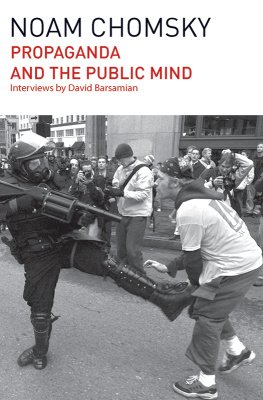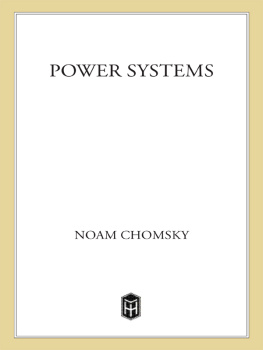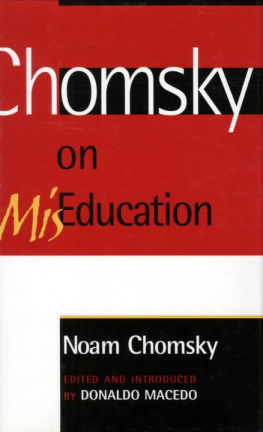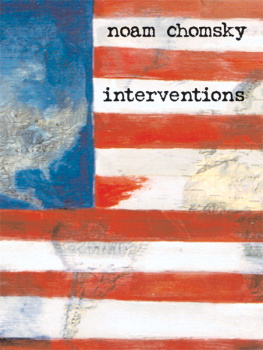Contents
Noam Chomsky
WHO RULES THE WORLD?
HAMISH HAMILTON
UK | USA | Canada | Ireland | Australia
India | New Zealand | South Africa
Hamish Hamilton is part of the Penguin Random House group of companies whose addresses can be found at global.penguinrandomhouse.com.
First published in the United States of America by Metropolitan Books, Henry Holt and Company, New York 2016
First published in the United Kingdom by Hamish Hamilton 2016
Copyright L. Valria Galvo-Wasserman-Chomsky, 2016
Portions of this book previously appeared, in different form, in the following publications: Al-Akhbar, Boston Review, chomsky.info, CNN.com, Mondoweiss, The New York Times syndicate, The Oslo Accords: A Critical Assessment (Petter Bauck and Mohammed Omer, eds.), TomDispatch and Z magazine
The moral right of the copyright holder has been asserted
ISBN: 978-0-241-97258-8
THE BEGINNING
Let the conversation begin
Follow the Penguin Twitter.com@penguinUKbooks
Keep up-to-date with all our stories YouTube.com/penguinbooks
Pin Penguin Books to your Pinterest
Like Penguin Books on Facebook.com/penguinbooks
Listen to Penguin at SoundCloud.com/penguin-books
Find out more about the author and
discover more stories like this at Penguin.co.uk
ALSO BY NOAM CHOMSKY
Hegemony or Survival
Imperial Ambitions
Failed States
What We Say Goes
Power Systems
Introduction
The question raised by the title of this book cannot have a simple and definite answer. The world is too varied, too complex, for that to be possible. But it is not hard to recognize the sharp differences in ability to shape world affairs, and to identify the more prominent and influential actors.
Among states, since the end of World War II the United States has been by far the first among unequals, and remains so. It still largely sets the terms for global discourse, ranging from such concerns as Israel-Palestine, Iran, Latin America, the war on terror, international economic organization, rights and justice, and others like them to the ultimate issues of survival of civilization (nuclear war and environmental destruction). Its power, however, has been diminishing since it reached a historically unprecedented peak in 1945. And with the inevitable decline, Washingtons power is to some extent shared within the de facto world government of the masters of the universe, to borrow the terms of the business pressreferring to the leading state capitalist powers (the G7 countries) along with the institutions they control in the new imperial age, such as the International Monetary Fund and the global trade organizations.
The
One consequence is so-called apathy: not bothering to vote. It has a significant class correlation. Likely reasons were discussed thirty-five years ago by one of the leading scholars of electoral politics, Walter Dean Burnham. He related abstention to a crucial comparative peculiarity of the American political system: the total absence of a socialist or laborite mass party as an organized competitor in the electoral market, which, he argued, accounts for much of the class-skewed abstention rates as well as the downplaying of policy options that may be supported by the general population but are opposed to elite interests. The observations reach to the present. In a close analysis of the 2014 election, Burnham and Thomas Ferguson show that rates of voting recall the earliest days of the nineteenth century, when voting rights were virtually restricted to propertied free males. They conclude that both direct poll evidence and common sense confirm that huge numbers of Americans are now wary of both major political parties and increasingly upset about prospects in the long term. Many are convinced that a few big interests control policy. They crave effective action to reverse long term economic
In Europe, the decline of democracy is no less striking, as decision making on crucial issues is shifted to the Brussels bureaucracy and the financial powers that it largely represents. Their contempt for democracy was revealed in the savage reaction in July 2015 to the very idea that the people of Greece might have a voice in determining the fate of their society, shattered by the brutal austerity policies of the troikathe European Commission, the European Central Bank, and the International Monetary Fund (specifically the IMFs political actors, not its economists, who have been critical of the destructive policies). These austerity policies were imposed with the stated goal of reducing Greeces debt. Yet they have in fact increased the debt relative to GDP, while Greek social fabric has been torn to shreds, and Greece has served as a funnel to transmit bailouts to French and German banks that made risky loans.
There are few surprises here. Class war, typically one-sided, has a long and bitter history. At the dawn of the modern state capitalist era, Adam Smith condemned the masters of mankind of his day, the merchants and manufacturers of England, who were by far the principal architects of policy, and who made sure their own interests were most peculiarly attended to no matter how grievous the effect on others (primarily the victims of their savage injustice abroad, but much of the population of England as well). The neoliberal era of the past generation has added its own touches to this classic picture, with the masters drawn from the top ranks of increasingly monopolized economies, the gargantuan and often predatory financial institutions, the multinationals protected by state power, and the political figures who largely represent their interests.
Meanwhile, scarcely a day passes without new reports of ominous scientific discoveries about the pace of environmental destruction. It is not too comforting to read that in the middle latitudes of the Northern
No less grim is the growing threat of nuclear war. The well-informed former Defense Secretary William Perry, no Cassandra, regards the probability of a nuclear calamity [as] higher today than during the Cold War, when escape from unimaginable disaster was a near miracle. Meanwhile the great powers doggedly pursue their programs of national insecurity, in the apt phrase of longtime CIA analyst Melvin Goodman. Perry is also one of those specialists who called on President Obama to kill the new cruise missile, a nuclear weapon with improved targeting and lower yield that might encourage limited nuclear war, quickly escalating by familiar dynamics to utter disaster. Worse yet, the new missile has both nuclear and nonnuclear variants, so that a foe under attack might assume the worst and overreact, initiating nuclear war. But there is little reason to expect that the advice will be heeded, as the Pentagons planned trillion-dollar enhancement of nuclear weapons systems proceeds apace, while lesser powers take their own steps towards Armageddon.

